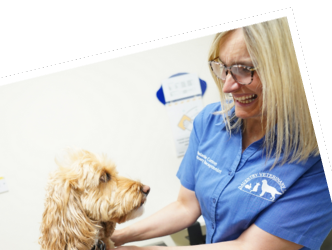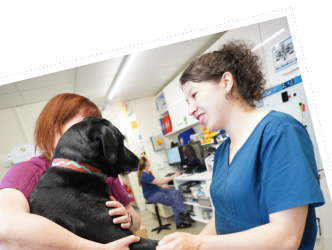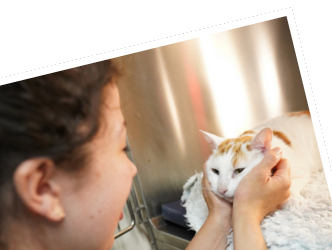
Neutering for dogs, cats & rabbits
Daventry Vets’ experienced veterinary team can talk to you about when is the right time to neuter your dog, cat, rabbit, or small furry pet.
Contact us about pet neutering
Benefits of pet neutering
Rescue and rehoming centres are currently all full to capacity. Please think carefully before breeding from your pet.
Neutering female dogs (also called ‘spaying’) involves removal of the uterus and ovaries (ovariohysterectomy) via an incision in the abdomen under general anaesthesia.
We can also offer Laparoscopic Spays performed by a visiting surgeon with advanced qualifications.
We will discuss the best age to spay your dog with you.
Once female dogs have started to have seasons, we recommend spaying at least 4 months after the end of the last season (this is to prevent the development of ‘false pregnancy’ after the surgery).
Health benefits associated with spaying female dogs:
- Prevention of unwanted pregnancies
- Prevention of the development of an infected uterus (pyometra) in later life
- Prevention of the development of mammary tumours (if spaying is carried out before the 2nd season)
- Prevention of false pregnancies
Neutering male dogs (also called ‘castration’) involves the removal of both testicles via a small incision just in front of the scrotum under general anaesthesia.
Neutering may not be advised with all male dogs, depending on breed, age, temperament and other dogs you may have. Our team can guide you through your decision.
Health benefits associated with neutering male dogs:
- Prevention of enlargement of the prostate gland in later life
- Prevention of the development of a certain type of tumour around the anal area
- Eliminates the potential for testicular tumours to develop
We currently recommend neutering both male and female cats from 5 months of age.
In male cats, the operation (castration) is very straightforward and does not require any stitches.
In female cats, the operation (spaying) involves the removal of the ovaries and uterus (ovariohysterectomy) through an incision in the cat’s abdomen.
Both operations for males and females are performed under general anaesthesia.
Health benefits associated with neutering male and female cats:
- Reduces fighting between tom cats and therefore reduces the risk of FeLV and FIV (Feline Leukaemia and Feline Immunodeficiency Virus) which can be spread by scratching and biting.
- Prevents the development of mammary tumours in females (if spaying is carried out at an early age).
- Prevents the drain on the female cat’s body caused by repeatedly coming into season, pregnancy, and nursing kittens.
- Reduces roaming in search of mates and therefore decreases the risk of being involved in road traffic accidents.
Anti-social behaviours prevented by neutering male cats:
- Reduces the strong odour of male cat urine.
- Reduces urine spraying to mark territory.
Neutering of both male and female pet rabbits is recommended.
We recommend neutering (spaying) female rabbits at 4 – 6 months of age. The operation involves the removal of the ovaries and uterus through an incision in the abdomen under general anaesthesia.
We recommend neutering (castration) or male rabbits from 3.5 – 4 months of age onwards. The operation involves the removal of the testicles via a small incision in front of the scrotum under general anaesthesia.
Health benefits associated with neutering female rabbits:
- Decreases the risk of developing cancerous tumours of the uterus. These tumours are very common in female rabbits and their prevention is the most important reason to spay.
- Prevention of false pregnancies.
- Decreases the risk of mammary tumours.
- Reduces aggression towards other rabbits and people.
Behavioural benefits associated with neutering male rabbits:
- Reduces unwanted mounting behaviour.
- Reduces aggressive behaviour towards other rabbits and people.
If you have any questions about pet neutering at our Daventry Veterinary Clinic, or you are ready to book your pet’s appointment, do get in touch with our team.
Contact us about neutering your pet




